Overwatering is the most common issue that many gardeners face who need help understanding the watering needs of their plants. Most plant owners think watering more can encourage plants to grow faster and healthier, which is completely wrong.
If provided with appropriate care, an overwatered plant will need 7-14 days to show signs of recovery. The recovery time will depend on factors like the level of damage, plant type, and soil drainage. You should maintain an ideal environment for the plant to recover quickly.
This article will show the reasons behind overwatering and how you can recover from this issue.
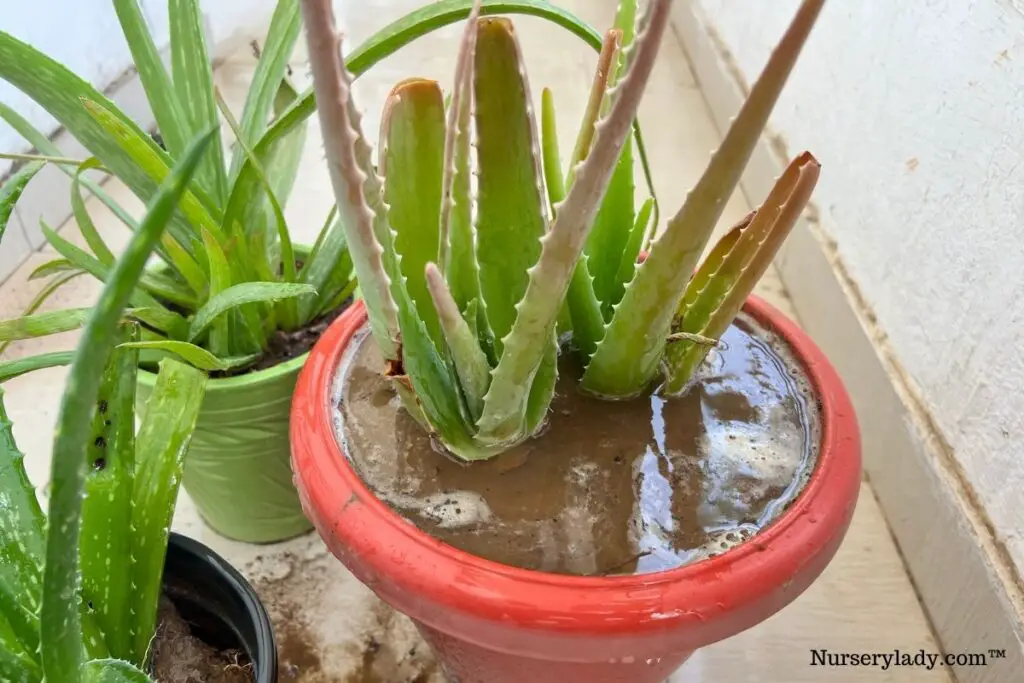
What are the common signs of an overwatered plant?
The signs to identify overwatered plants are:
- Discolored leaves: This is the first sign of overwatering a plant can get. The leaves eventually turn brown, yellow, and black and drop off.
- Soggy soil: The soil becomes wet, muddy, and soggy because of continuous watering. You can even see water standing on the surface of the topsoil.
- Wilted foliage: You will get to see wilted and droopy foliage. It happens mostly because of root rot disease.
- Pests: If the plant suffers from overwatering for too long, you will notice moisture-loving pests on the soil surface.
- Root rot: The roots start to turn mushy, soft, and brown, indicating root rot disease. Also, you will notice a rotting smell coming from the soil surface. This happens because of suffocation inside the soil.
- Slow growth: The plants start to show slow and stunted growth or the plant can even stop growing entirely.
- Thin and weak stems: The plant can show abnormal growth, like weak and thin stems, because of excess water.
If you notice any of the signs above in your plants, they will likely suffer from overwatering.
It’s better to take immediate action as soon as you find out.
Factors that can affect the recovery time of overwatered plants
How long your plants will take to recover from overwatering depends on several factors.
Let’s such each factor in detail.
The amount of the damage
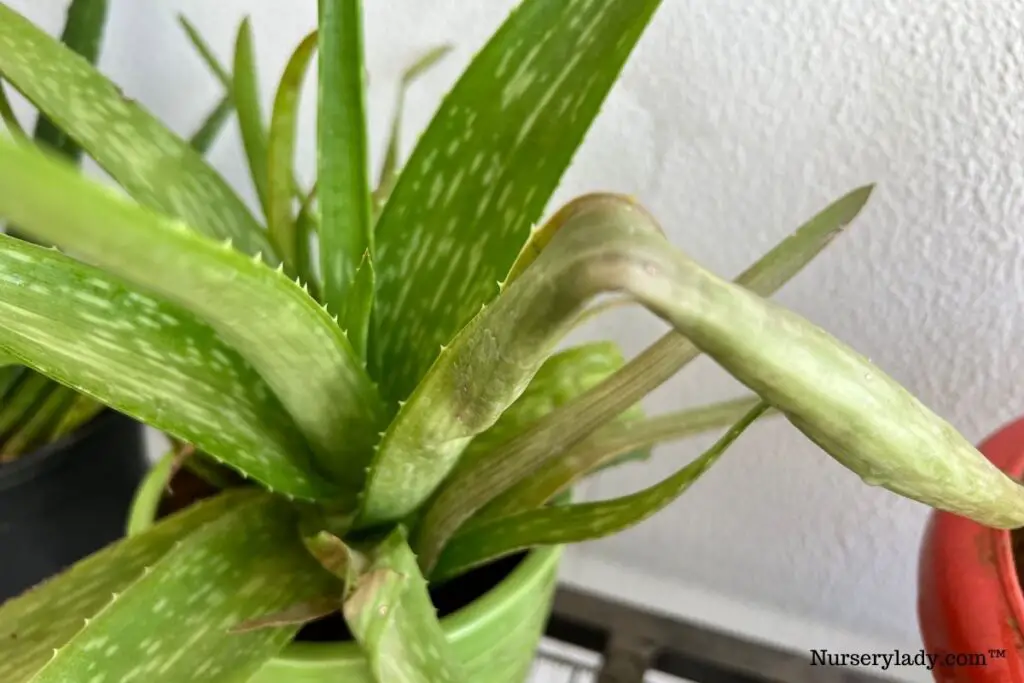
The amount of damage your plant has suffered from overwatering can affect the recovery time.
The more serious the damage, the more plants will take time to recover.
If your plant suffers from overwatering for longer, the damage level will be much higher.
In such situations, the recovery time becomes slow, and the plant can even take months to return to normal health.
Plant type
The recovery time also varies with plant type.
If you have a fast-growing plant, then it will recover much faster.
Fast-growing plants have a good ability to utilize water as compared to slow-growing plants.
It becomes very challenging to recover slow-growing plants as they can take a very long time to recover.
Soil drainage
If the soil doesn’t contain that much compost and potting mix, the soil is compact and has poor drainage.
The plant will eventually take more time to recover from overwatering in such soil.
This happens because compact soil absorbs more water than usual without draining the excess.
To improve the soil drainage, add coarse sand or perlite.
This will help the soil to become slightly loose.
The recovery time will also increase if the water passes freely without interruption.
Light
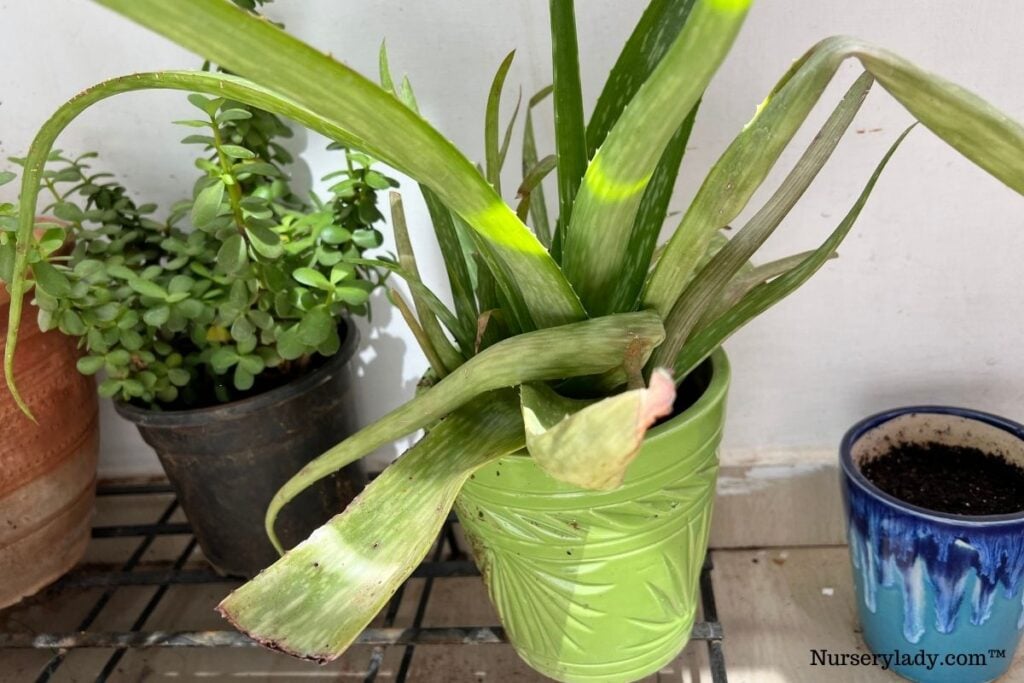
Light is the most important factor that directly affects the recovery time of a plant.
While treating the plant from overwatering, it’s necessary to provide them with proper light.
But ensure to give only a little sunlight as it can scorch the leaves.
Never place the plant in the dark or shade, as it will take longer to recover.
Placing the plant in indirect sunlight is best to increase the recovery rate.
Looking for gardening supplies? We have tested 100's of products before recommending them to you guys. Check out our best pick below:
| Image | Gardening Supplies | Best Price? |
|---|---|---|
 Top
Top Top
Top | Raised Garden Bed Kit | Check On Amazon |
 | XLUX Soil Moisture Meter, Plant Water Monitor, Soil Hygrometer Sensor for Gardening, Farming, Indoor and Outdoor Plants, No Batteries Required | No Results |
 Top
Top Top
Top | 82 Pcs Garden Tools Set and Extra Succulent Tools Set | Check On Amazon |
 | Joeys Garden Expandable Garden Hose with 8 Function Hose Nozzle, Lightweight Anti-Kink Flexible Garden Hoses, Extra Strength Fabric with Double Latex Core, (50 FT, Black) | No Results |
 Top
Top Top
Top | Dual Chamber Compost Tumbler | Check On Amazon |
 Top
Top Top
Top | Sunnyglade Plant Stakes | Check On Amazon |
 Top
Top Top
Top | Organic Cold Pressed Neem Seed Oil | Check On Amazon |
 Top
Top Top
Top | Mighty Mint Gallon :-Insect and Pest Control Peppermint Oil | Check On Amazon |
 Top
Top Top
Top | Scotts DiseaseEx Lawn Fungicide | Check On Amazon |
 Top
Top Top
Top | Jacks Classic 20-20-20 All Purpose Fertilizer | Check On Amazon |
 Top
Top Top
Top | 30,000 Seeds Pollinator Attracting Wildflower Mixture | Check On Amazon |
 Top
Top Top
Top | Survival Vegetable Seeds Garden Kit-Over 16,000 Seeds | Check On Amazon |
Time of year
The recovery time also depends on the changing season.
If the plants are recovering during the winter season, they will usually take more time to recover.
While on the other hand, the recovery time increases during the summer season.
But they are only valid for some kinds of plants.
If the plant takes more time to recover during the winter season, then don’t be amazed about it as it is common.
Humidity
The more humidity in the atmosphere, the more the plant will take time to recover from overwatering.
It is easy to maintain humidity for indoor plants.
While in the case of outdoor plants, it becomes impossible to maintain the outside environment.
For outdoor plants, you have to transplant the entire plant in an area where there will be no other plants growing.
What are the risks of overwatering your plants?
You put your plant at a huge risk because of overwatering.
Once your plant is overwatered, bringing it back to its proper health can be challenging.
Overwatering can also kill the entire plant if not treated on time.
So, you can’t take this problem casually.
Now, Let us discuss all the risks.
Overwatering harms the roots
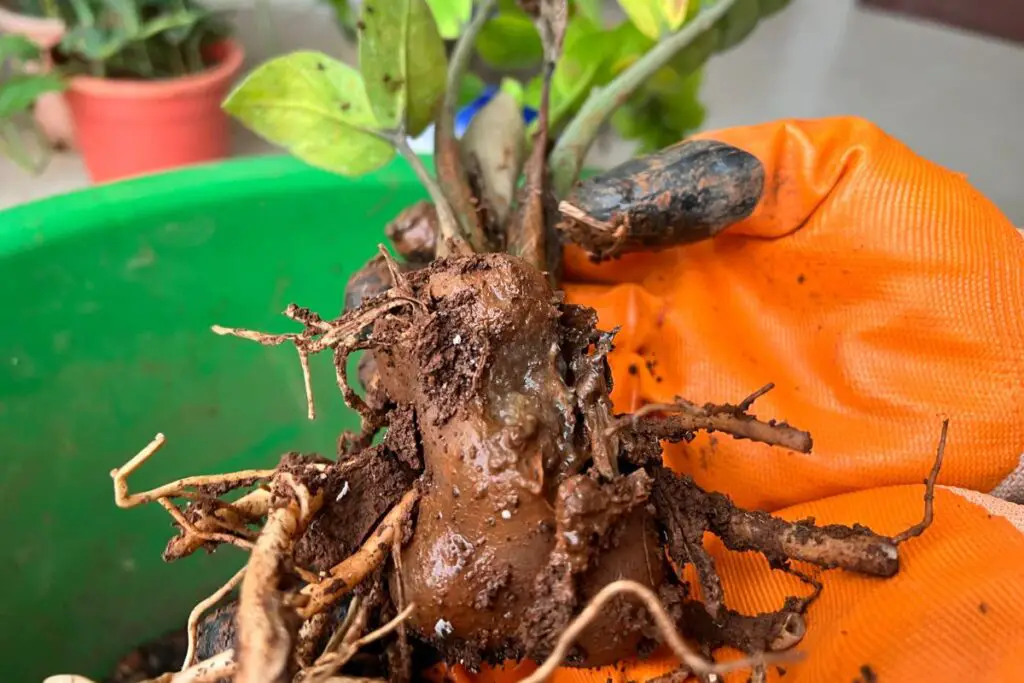
Overwatering can cause root rot disease.
When you overwater the plant, the entire soil becomes wet with no oxygen in it.
This creates suffocation at the roots.
As the roots fail to breathe in such a wet environment, they start decaying and turning brown and mushy in texture.
This causes severe destruction to the entire root system that can even kill the plant.
Overwatering encourages fungal diseases and infections
As the oxygen decreases in the soil, it gives an anaerobic situation for fungal infections and diseases to thrive.
Once fungi attack the plant, it will continue to spread at an immense speed by spores.
This can affect the health of an entire plant.
Overwatering attracts pests
Pests usually thrive in wet conditions, so when you overwater the plants, they attract pests like spider mites, thrips, fungus gnats, mealy bugs, etc.
Pests take in all the nutrients from the plant by feeding on the stems, leaving it completely weak.
If they are not removed at the right time, the plant may not survive for so long.
Overwatering washes out fertilizers.
Fertilizers help plants to boost their health and growth by providing nutrition.
However, overwatering the plant washes out all the fertilizers, leaving them nutritionless and weak.
Your plant can also end up dying because of weakness.
What are the causes of overwatering the plants?
Let us discuss the causes behind overwatering plants.
Frequent watering
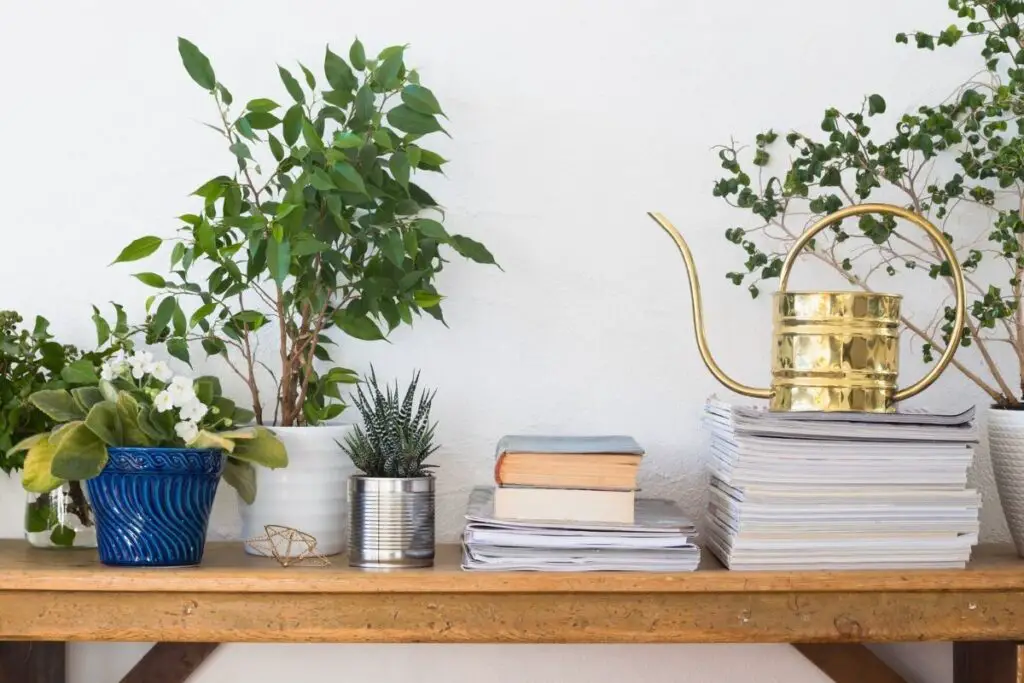
Watering the plant without checking the soil’s moisture level is one of the common causes of overwatering.
The plant needs water only when the topsoil is 50-60% dry.
Otherwise, wait before you water.
Try checking the moisture level by inserting your index finger into the soil, or you can use a moisture meter.
Wrong soil mix
If your plants grow in tight and compact soil, they will frequently suffer from overwatering.
To improve the soil mix, add sand, perlite, and compost to the existing soil.
You can also change the entire soil with a fresh well-retained potting mix.
Low sunlight
If you are growing your plant where sunlight is extremely low, the plant can frequently suffer from overwatering.
If your plant is covered with any shade, try to remove them or transplant them to a new area where it will receive sufficient sunlight.
Watering during winter
Watering continuously during winter can frequently cause overwatering issues.
The Winter months are a dormancy period for plants, so they don’t need much water.
Also, during the winter season, there is low temperature and less sunlight, so the soil will not get dry quickly.
It is better to avoid watering during such a time.
High humidity
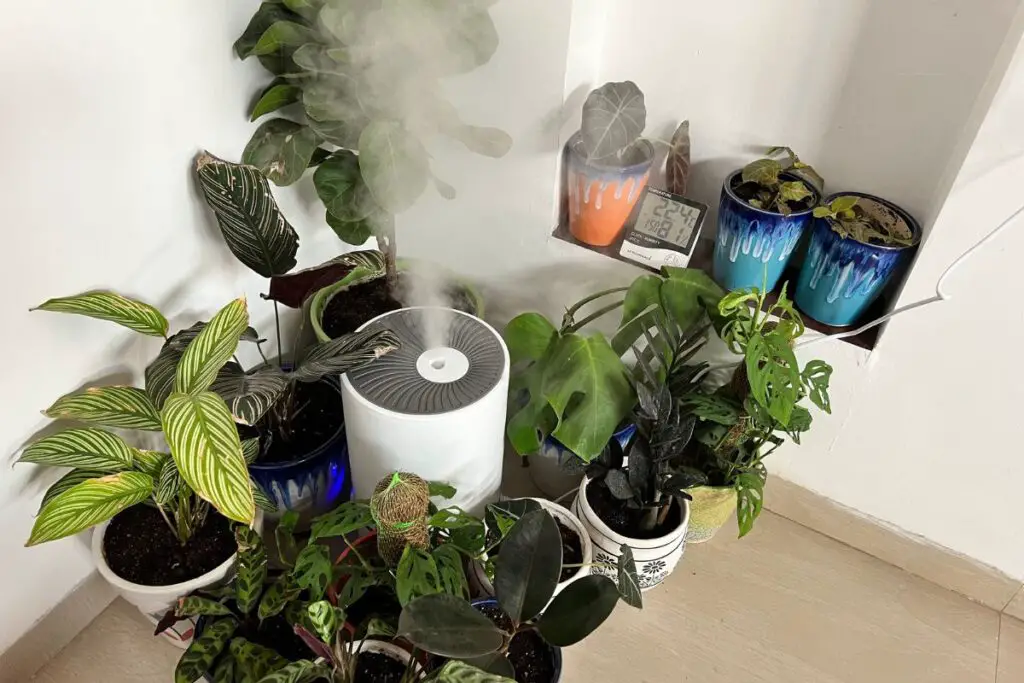
Providing the plant with frequent watering when high humidity in the atmosphere can cause overwatering.
The more humidity in the atmosphere, the less plant will need water.
It would help if you reduced watering in a humid environment.
How to recover an overwatered plant?
The first step to recovering an overwatered plant is to stop watering immediately.
Before watering your plant again, wait until the topsoil is dry.
Let’s discuss the ways to recover an overwatered plant:
- Immediately stop watering the plant to avoid further health issues, and wait until the soil dries.
- Remove all the dead and discolored leaves of the plant. If you notice that the branches are also turning brown, remove them, as it’s impossible to revive damaged parts.
- If the soil is compact, add air pockets with the help of an aerator. This will allow oxygen supply in the soil.
- If your plant grows with other moisture-loving plants, it is better to transplant it to a new location. This is because high humidity decreases transpiration, which will not let the excess water come out of the plant.
- Try to provide bright indirect sunlight to the plant so the soil will dry quickly. But make sure the light should not be direct; if it is, provide shade to avoid stressing the plant while it is recovering.
- If the soil is heavy, improve the texture by adding compost, perlite, or sand. Or change the entire soil with proper drainage and good water retention.
- Don’t ever fertilize the damaged plant when recovering, as it can worsen the situation even more.
How to recover a plant with root rot?
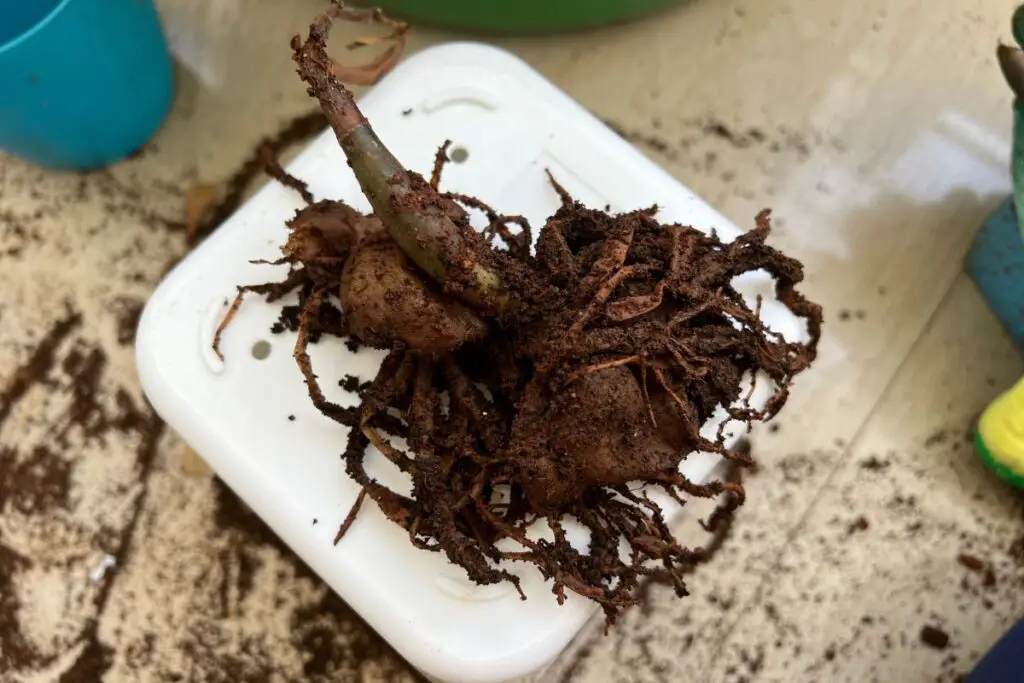
Don’t worry if your plant is suffering from root rot.
Let us discuss ways to recover:
- Carefully take out the roots from the soil to see the level of damage.
- Shake the plant to remove the soil present in the roots. Then, wash them with water. Be careful and don’t cause any harm to roots while washing them.
- Cut all the infected roots with the help of sterilized and sharp scissors. Before cutting, always sanitize the tools with rubbing alcohol.
- Disinfect the roots with a fungicide to avoid further spreading the fungus.
- Wait for some time until the roots become dry.
- After getting rid of the infected roots, re-plant the plant where it will receive proper sunlight and good airflow; also, use a fresh new soil mix.
- After re-planting, water the plant slowly and don’t fertilize it until it is recovered.
How to prevent overwatering your plant?
Let’s discuss the tips to avoid overwatering in the future:
- While planting, always choose a location where the plant will receive proper sunlight.
- Always keep a few distances while planting the plants to avoid humidity.
- Water only after checking the soil’s moisture. Insert the finger 1 inch deep into the soil or use a moisture meter.
- Choose soil that has good drainage and moisture retention. Try to renew the soil by adding soil amendments frequently.
- Never fertilize and water the plant frequently during the winter months.
- Keep applying Neem oil to the plant every month to avoid pest infestations.
- Always understand the plant type while watering them. If the plant is moisture-loving, it will need more than the usual plants.
- Avoid watering during the rainy season. If it continuously rains in your region, you should provide shade to the plant.
How often does a plant need water?
How often a plant needs water depends on factors like plant type, season, soil drainage, and region.
The watering requirement is different for each plant.
But in the majority, most plants need to be watered 1 to 2 times a week.
The amount of water also varies with the climatic conditions and region you are living in.
Check the soil before watering if you need clarification about when to water the plant.
Final words
If you notice the plant suffering from overwatering, take appropriate measures without wasting more time. The recovery rate of plants depends on factors like plant type, location, drainage, light, etc.
Usually, plants take 7 to 14 days to recover from overwatering. But, if you think your plant is not recovering at a normal rate, then don’t worry because it varies with the different factors.
Source: University of Illinois, Growing Indoor Plants with Success, Agriculture, and Natural Resources, University of California, Missouri Botanical Garden.
